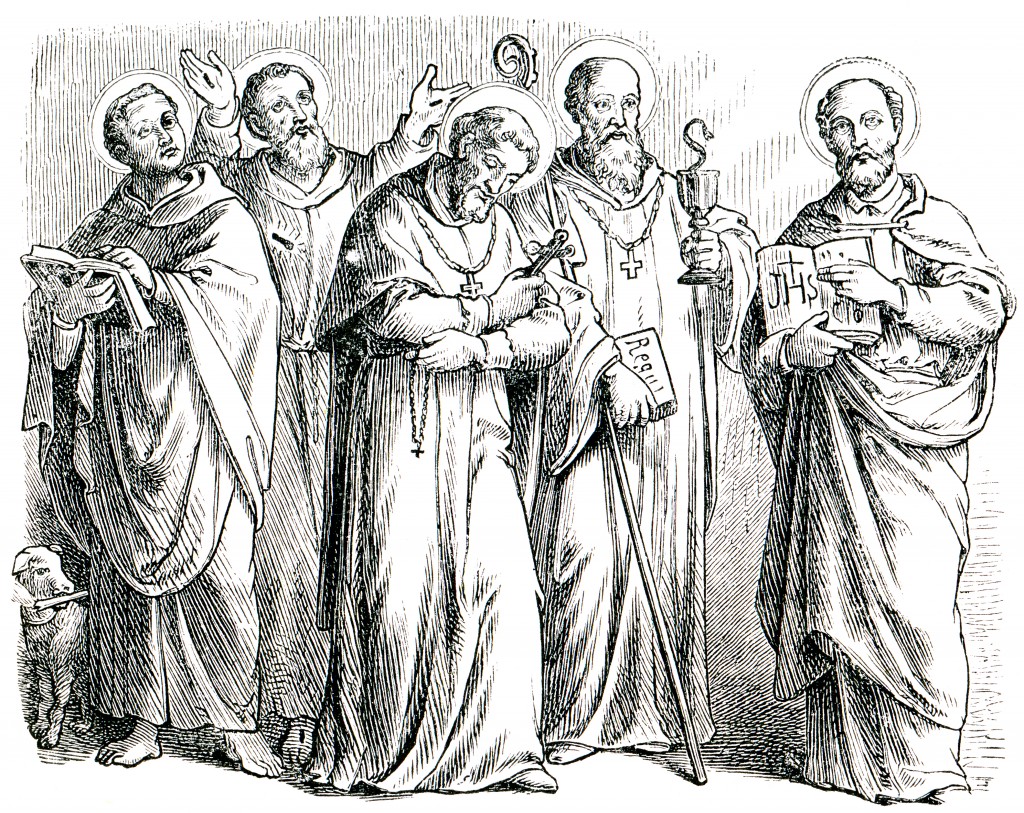Editors’ Note: This article is part of the Public Square 2014 Summer Series: Conversations on Religious Trends. Read other perspectives from the Patheos community here.
There’s a fascinating conversation that’s been happening in slow motion in various corners of the internet about what Rod Dreher calls ‘the Benedict Option’, for Christians in the modern West. It’s based on Alisdair McIntyre’s famous words: “We are waiting not for a Godot, but for another—doubtless very different—St. Benedict.” McIntyre urges the formation of “local forms of community within which civility and the intellectual and moral life can be sustained through the new dark ages which are already upon us.”
Different writers have offered their own thoughts on the Benedict Option, and some of the most interesting have been those who’ve proposed alternatives: Pascal-Emmanuel Gobry’s Francis Option places a greater emphasis on the common ground between Christianity and modernity, and on the need for Christians to be active participants shaping the broader culture. Samuel Goldman’s Jeremiah Option is somewhere in between, wondering if modern day Christians can learn from the experience of the Jews in Babylon, exiles who nonetheless “plant roots within and work for the improvement of the society in which they live, even if they never fully join it.”

Rod, PEG and Goldman all agree that we need places of retreat. All of them agree that we need to be a leaven in society. It’s a question of finding the right balance – I would say the right version of the great Catholic both/and.
I think the pieces are worth reading – not just because these are great writers, but because these questions of integration and separation, preservation and renewal, are the most important questions facing the Catholic Church, and Christianity more broadly, in the modern Western world. Because here’s the thing: nobody has really figured out how to effectively preach the Gospel to the affluent, post-capitalist West. The New Evangelisation is very much a work in progress.
This is not just a thought experiment. It’s a survival strategy. Finding the perfect synthesis between retreat and engagement is a balance that will have to be found and re-found, over and over again, in large and small decisions made by Ordinary Decent Catholics, be they bishops or high-school students.
It’s worth knowing what exactly we want to achieve, and it’s essential never to forget what victory looks like: “Every knee shall bow, every tongue confess.” That’s not a goal we can or should expect to achieve any time soon, but as Christians we simply don’t have the right to stop trying. As Penn Jillette puts it, if we really believe this stuff, it’s inexcusable not to tell everyone about it, and do what we can to show them the truth of it. If we think that to live life as a Catholic is to live it to the full, that Jesus really is God and man, the ground of all being and a carpenter of indeterminate skill, we can do many things about that, but we cannot stay silent.
But again – that’s easy to say. Doing it is a different matter. To what extent should we evangelise with words, and to what extent by the lives we lead? “Preach at all times, and when necessary, use words” as St. Francis probably didn’t say – but words are almost always necessary, eventually. What does the Catholic kid in the drama group say when everyone around her sees her faith and her Church as out-of-touch, bigoted, and – worst of all – on the wrong side of history? Will the computer science graduate who believes in a traditional sexual ethic spend his life holding his tongue, or risk being quietly frozen out of the tech industry – Brendan Eich without the publicity? If these people have Benedict Option communities to retreat to, what is the Franciscan strategy for taking the faith that those communties steward back out into the street?
We have to find a way – or a new version of the old way – of being in the world but not of it.
The simple answer is “we must all be saints”. And that’s profoundly true, and no less so for being simple. But as Pascal-Emmanuel Gobry writes, we need methods.
The rosary is a method. The Liturgy of the Hours is a method. The Spiritual Exercises are a method. The liturgy itself is a method. The liturgical calendar is a method. The sacraments are a method. Growth in virtue and holiness is (or, rather, should be) a method. The Rule of Benedict is a method.
We’re going to have to make some more. That’s not going to be easy.
Take the question of homosexuality – perhaps the point of greatest tension between the Church and the modern West. I’ve got a pretty good working theory for what the Church should do here, which runs something like this:
1. Go on an archive binge at SpiritualFriendship.org
2. Internalise and implement
Doing that, though, will be an immense challenge. What will we do in parishes so that gay Catholics are truly visible, truly welcome, truly equal? How will we make the Church home for them? On the flip side, how do we convince a massgoing public that is in the process of abandoning the Church’s teaching on marriage that a third way is even worth pursuing?
What does the Bishop of Galway do when the Society of St. Vincent De Paul gives €45,000 to the gay-marriage-supporting group Amach! to set up an LGBT resource centre in Galway City? How does the church speak about marriage when many of its words have become literally incomprehensible to many in the modern West? How will the Church’s words on political and legal issues around marriage impact its ministry to individual gay people? Should we de-emphasise the former to focus on the latter?
I’ve asked a bunch of questions in this post. I don’t have very many answers (though I have some thoughts – this is not the last post this blog). We live, as the not-actually-Chinese curse goes, in interesting times (though which times aren’t?).
There’ll be a lot of trial and error, a lot of winging it, and lot of praying to God that we don’t screw things up too disastrously.
But we wouldn’t be the first Christians to have found ourselves is such a situation. Yes – the modern world brings particular challenges that the Church hasn’t faced before. But being in the two thousand and fourteenth year of this voyage comes with advantages too – not least that we have Benedict, and Francis, and Jeremiah (and a whole lot of other saints besides) to argue about, and to inspire us in the days ahead.
I, for one, am looking forward to them.












